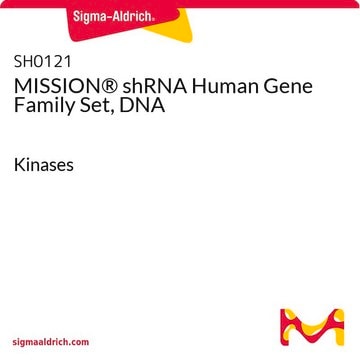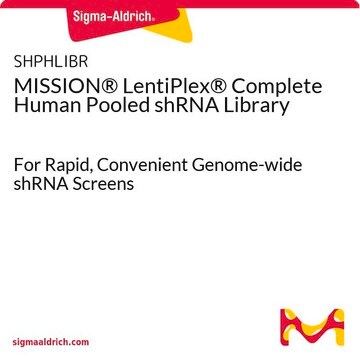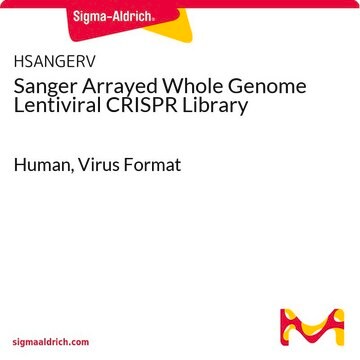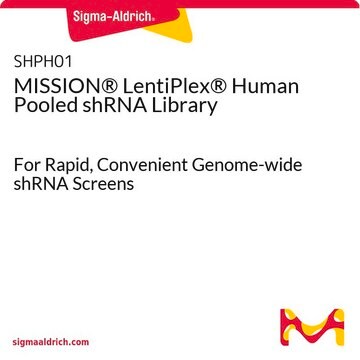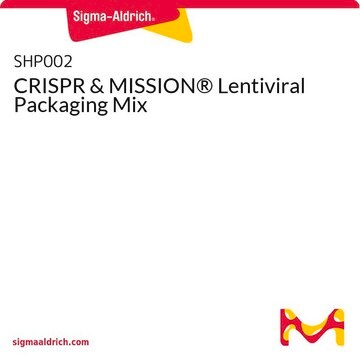HKCRISPR
Human Kinase Lentiviral CRISPR Pool
Selecione um tamanho
R$ 75.573,00
Previsão de entrega em30 de março de 2025
Selecione um tamanho
About This Item
R$ 75.573,00
Previsão de entrega em30 de março de 2025
Produtos recomendados
embalagem
pkg of 8x25 μL (vials)
Nível de qualidade
concentração
5x108 VP/ml (via p24 assay)
aplicação(ões)
CRISPR
Condições de expedição
dry ice
temperatura de armazenamento
−70°C
Categorias relacionadas
Descrição geral
Sigma-Aldrich has combined its long-standing expertise in pooled lentiviral screening with its CRISPR genome editing technology to create a powerful new discovery tool: the Sigma CRISPR human kinase pooled lentiviral library. This pooled library targets the human kinome, a collection of approximately 700 genes commonly associated with development and disease, with an average of nearly 9 unique knockout CRISPR clones per kinase gene. The lentiviral format allows for stable integration, selection, and enrichment of transduced cells, allowing researchers to functionally screen hundreds of kinase genes for a fraction of the time and cost of screening arrayed clones.
The Sigma CRISPR human kinase pooled lentiviral library uses a single lentiviral vector (pLV-U6g-EPCG) to deliver Cas9, gRNA, a puromycin selection marker, and GFP to target cells. The vector features a robust truncated human elongation factor−1 promoter alpha (tEF1a) driving expression of the Cas9 protein and a human U6 promoter ensuring the efficient transcription of gRNA in most mammalian cell types. The 2A peptides (P2A and T2A) flanking Cas9 allow stoichiometric expression of the puromycin resistance gene, Cas9, and GFP as individual proteins from a single transcript (see vector map below). Whether you are interested in small molecule screening or in defining developmental signaling pathways, Sigma′s CRISPR human kinase pooled lentiviral library offers researchers a high throughput solution to uncovering novel kinase targets that only a knockout screen can reveal.
Aplicação
Características e benefícios
Protein kinases are among the largest and most well studied gene families. Protein phosphorylation plays an essential role in intercellular communication in eukaryotic organisms by mediating signal transduction during development, transcription, immune response, metabolism, apoptosis, and cell differentiation. Aberrant regulation of kinases plays a causal role in many diseases, and the study of these proteins and their functions will contribute to the discovery and development of new therapeutics.
The Sigma CRISPR Human Kinase Lentiviral Pooled Knockout Library contains:
- Over 6,000 unique lentiviral clones expressing Cas9 and gRNA sequences designed to functionally inactivate (knockout) nearly 700 human kinase genes
- High clone coverage (7−10 distinct gRNAs per kinase gene, average of 8.6 per gene) increases the statistical strength of your hit analysis
- Numerous built-in enrichment and depletion clones allow researchers to confidently gauge the success of their pooled screening experiments
- The pool contains 100 non-targeting control gRNAs as normalization standards
- gRNA design and tiling was created with a stringent bioinformatics approach to minimize off−target modification of each gRNA
Componentes
Outras notas
Princípio
Lentiviral-based particles permit efficient transduction and integration of the expression cassette into differentiated and non-dividing cells, such as neurons and dendritic cells. Self-inactivating replication incompetent lentiviral particles are generated in producer cells (HEK 293T) by co-transfection with compatible packaging plasmids. In addition, the lentiviral transduction particles are pseudotyped with an envelope G glycoprotein from Vesicular Stomatitis Virus (VSV-G), allowing transduction of a wide variety of mammalian cells.
Nota de preparo
Prior to performing a library-scale screening, two preliminary experiments must be conducted: (1) determine the sensitivity of target cell type to puromycin (kill curve), and (2) determine the functional titer of the lentivirus in your cell type by completing a colony-forming assay (measured in CFU/ml). The calculation of MOI (multicity of infection) should be based on the value of CFU. Different cell types vary in transduction efficiency and different lentiviral constructs do not behave identically, so it is critical to optimize your experimental conditions with control lentiviral CRISPR clones (available from Sigma) prior to performing your pooled experiment.
Informações legais
produto relacionado
Código de classe de armazenamento
12 - Non Combustible Liquids
Classe de risco de água (WGK)
WGK 3
Ponto de fulgor (°F)
Not applicable
Ponto de fulgor (°C)
Not applicable
Escolha uma das versões mais recentes:
Certificados de análise (COA)
Lamentamos, não temos COA para este produto disponíveis online no momento.
Se precisar de ajuda, entre em contato Atendimento ao cliente
Já possui este produto?
Encontre a documentação dos produtos que você adquiriu recentemente na biblioteca de documentos.
Os clientes também visualizaram
Active Filters
Nossa equipe de cientistas tem experiência em todas as áreas de pesquisa, incluindo Life Sciences, ciência de materiais, síntese química, cromatografia, química analítica e muitas outras.
Entre em contato com a assistência técnica









